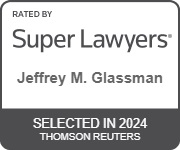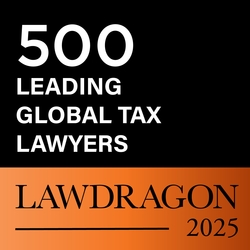
Mr. Glassman is a firm partner with a practice focus that includes counseling individuals, businesses, tax-exempt organizations, and trusts and estates with respect to their most demanding tax planning and controversy issues. His tax controversy practice involves representing clients in all stages of civil and criminal tax matters, including complex IRS examinations, administrative appeals, ruling requests, payroll tax disputes, federal tax collection issues, government investigations, and litigation. He works with clients in developing strategies to resolve sensitive compliance issues such as unreported income, unfiled returns, and undeclared offshore accounts and assets. Recently, he has focused significant time on tax disputes involving private aircraft, tax-exempt organizations, and employee retention credit matters (ERC), including ERC refund lawsuits against the federal government. The vast majority of Mr. Glassman’s cases are resolved privately and never made public.
Mr. Glassman is the chair of the Tax Controversy Committee of the State Bar of Texas Tax Section, Vice Chair of the American Bar Association Section of Taxation's Court Procedure and Practice Committee, and founder and former chair of the Dallas Chapter of the Federal Bar Association Section on Taxation. He is a past recipient of the American Bar Association Tax Section’s John S. Nolan Fellowship.
Mr. Glassman is a prominent speaker on various tax issues and speaks on these topics throughout the United States and is also a significant contributor to the Meadows Collier Talks Tax blog.
Prior to joining the firm, Mr. Glassman worked at two international law firms and an international “Big 4” accounting firm. He served as a Law Clerk for The Honorable Maurice B. Foley of the United States Tax Court in Washington, D.C.
Mr. Glassman was admitted to practice Texas in 2014, the District of Columbia in 2008, and Maryland in 2007.

.png)








- Georgetown University Law Center, LL.M. in Taxation, 2011
- The George Washington University Law School, J.D., 2007
- Associate Member, The George Washington International Law Review
- University of Florida, Warrington College of Business, B.S., Finance, 2003
- Teaching Assistant, Business Law
- Executive Education: MIT Media Lab (through Massachusetts Institute of Technology)
- Cryptocurrency Course
- American Bar Association
- Vice Chair, Section of Taxation, Court Procedure & Practice Committee
- Member, Administrative Practice Committee
- Member, Civil & Criminal Tax Penalties (CCTP) Committee
- Member, Crypotcurrency Tax Force
- State Bar of Texas
- Tax Section
- Chair, Tax Controversy Committee, 2024-2025
- Co-Chair, Tax Controversy Committee, 2023-2024, 2025-2026
- Vice-Chair, Tax Controversy Committee, 2022-2023
- Graduate Member, State Bar of Texas Tax Section Leadership Academy, 2016-2017
- Federal Bar Association
- Section of Taxation, Dallas Chapter - Past Chair and Founder
- Dallas Bar Association
- Tax Section
- District of Columbia Bar
- Maryland Bar
- American College of Tax Counsel (ACTC)
- Fellow
- United States District Court for the Western District of Texas
- United States District Court for the Eastern District of Texas
- United States District Court for the Northern District of Texas
- United States District Court for the Southern District of Texas
- United States District Court for the District of Colorado
- United States District Court for the District of New Mexico
- United States Tax Court
- United States Court of Federal Claims
- United States Court of Appeals for the Fifth Circuit
- United States Court of Appeals for the Federal Circuit
- Lawdragon 500 Leading Global Tax Lawyers for Tax Controversy and Litigation and Estates, 2025
- John S. Nolan Fellowship, American Bar Association, 2022-2023
- Best Lawyers in Dallas, D Magazine for Tax: General, 2020-2022 and 2024, and Tax: Litigation, 2023-2025
- Best Lawyers Under 40 in Dallas, D Magazine, 2020
- Texas Rising Stars, Texas Monthly and Texas Super Lawyers - Rising Stars Edition, 2020-2021
- Texas Super Lawyers, Texas Monthly and Texas Super Lawyers, 2022-2025
- GOP Plans to Halt Covid Credit Poised to Stir News Challenges, Bloomberg Law News by Erin Slowey (May 15, 2025)
- IRS is 'Daring People to Sue' Over Pandemic Credit Crackdown, Bloomberg Law News by Erin Slowey and John Woolley (Sept. 25, 2024)
- Continued Worker Credit Freeze Could Push Cos. To Court, Law360 article by David van den Berg (July 8, 2024)
- Employee Retention Credit Auditors Are Digging Deep. Tax Notes article by Nathan Richman (May 15, 2024)
- ABA Webinar Discusses ERC Update and Best Practices, Thompson Reuters article Christopher Wood (May 15, 2024)
- Employer Might Not Rush To Withdraw Worker Credit Claims, Law 360 article by David van den Berg (October 27, 2023)
2026 ABA Tax Section Midyear Tax Meeting... [ read ]
State Bar of Texas Tax Section CLE Webinar... [ read ]
TXCPA Permian Basin CPE Expo 2025... [ read ]
TXCPA Panhandle Chapter Tax Institute 2025... [ read ]
Navigating Federal Tax Litigation and Appeals... [ read ]
2025 American Bar Association Midyear Tax Meeting... [ read ]
Tax Law in a Day... [ read ]
State Bar of Texas Webinar... [ read ]
2024 TexasBarCLE presents the 42nd Annual Course-Tax Law: Before the Sunset... [ read ]
Summer Tax Summit 2024... [ read ]
TXCPA Panhandle Chapter Tax Institute... [ read ]
TexasBarCLE presents the 42nd Annual Course, Tax Law: Before the Sunset... [ read ]
ABA Tax Section CLE Webinar... [ read ]
Tax Controversy: Litigation Overview and Tips... [ read ]
Replay - 2024 Professional Issues Update... [ read ]
Tax Law in a Day Day Two)... [ read ]
TXCPA 2024 Professional Issues Update... [ read ]
ABA 2024 Midyear Tax Meeting... [ read ]
Meadow Collier January 9, 2023 One-Hour Webinar... [ read ]
State Bar of Texas Tax Section - One-Hour FREE Webinar on "Tax Controversy: Administrative Overview and Tips"... [ read ]
Texas Management Group (TMG) Annual Meeting-Day 2... [ read ]
American Bar Association Virtual Fall Tax Meeting-Oct. 17, 2023... [ read ]
Nuts and Bolt of Tax Litigation-Part 1 CLE Webinar Series from the ABA Tax Section... [ read ]
Tax Controversy: Tips for Tax Practitioners and Recent Developments Webinar... [ read ]
ABA Section of Taxation 2023 May Tax Meetings... [ read ]
TXCPA Professional Issues Update Webcast... [ read ]
2022 Dallas Practice Management Group... [ read ]
Texas Management Group (TMG) Annual Meeting (Day One)... [ read ]
ABA Section of Taxation 2022 Fall Meeting... [ read ]
September 2022 1-Hour Webinar... [ read ]
Armanino Presentation... [ read ]
Cryptocurrency: A Tax and Estate Planning Perspective... [ read ]
ABA Section of Taxation 2022 May Tax Meeting... [ read ]
Lorman Webinar... [ read ]
American Bar Association Section of Taxation Virtual 2021 Midyear Tax Meeting... [ read ]
American Bar Association Section of Taxation Virtual 2020 May Tax Meeting: Court Procedure & Practice... [ read ]
American Bar Association Section of Taxation 2020 Midyear Tax Meeting... [ read ]
21st Annual Meadows Collier Tax Conference... [ read ]
American Bar Association 2019 Fall Tax Meeting... [ read ]
Section of Taxation 2019 May Tax Meeting of the American Bar Association... [ read ]
2019 Midyear Meeting American Bar Association Section of Taxation... [ read ]
2018 Fall Tax Meeting: ABA Section of Taxation and Real Property & Estate Law, Trust and Estate Division... [ read ]
2018 Fall Tax Meeting: ABA Section of Taxation and Real Property & Estate Law, Trust and Estate Division... [ read ]
Changes to IRS Voluntary Disclosure Program are Coming... [ read ]
Jeffrey M. Glassman shares insights from the American Bar Association's 2025 Criminal Tax Fraud and Tax Controversy Conference, where IRS Criminal Investigation Chief Guy Ficco announced that changes to the IRS voluntary disclosure program are coming.
The Underrated Power of Tax Court Rule 124 in Tax Exempt Status Revocation Cases... [ read ]
Jeffrey M. Glassman discusses insights from a panel on Challenging Revocations to Tax-Exempt Status, including a practical suggestion from a Tax Court judge that could help organizations resolve these cases more efficiently.
Government Shutdown Could Require More ERC Lawsuits - And Form 907 May Offer No Relief... [ read ]
Jeffrey M. Glassman examines how the ongoing federal government shutdown is disrupting IRS operations and what it means for employers with pending ERC refund claims.
Employee Retention Credit (ERC) Examinations Surge... [ read ]
Jeffrey M. Glassman examines the IRS's intensified examinations surrounding Employee Retention Credit claims and how businesses can best prepare for heightened scrutiny.
A Step in the Right Direction: Appeals Case Memos can now be Shared with Taxpayers... [ read ]
Firm partner Jeffrey M. Glassman explores a major win for transparency in tax disputes: the IRS Independent Office of Appeals will now share Appeals Case Memoranda (ACMs) with taxpayers upon informal request.
New ERC Laws are Here: What Are They?... [ read ]
Firm partner Jeffrey M. Glassman breaks down the sweeping new rules regulating the Employee Retention Credit and the new risks for employers and advisors alike.
Strategic Considerations for Tax-Exempt Status Revocation: Appeals and Litigation... [ read ]
Firm partner Jeffrey M. Glassman continues his deep dive into the IRS examination landscape and the critical next steps for organizations to resolve matters favorably.
Strategic Considerations for Tax-Exempt Status Revocation IRS Examinations... [ read ]
In our latest blog post, Jeffrey M. Glassman explores the high-stakes of IRS examinations that can lead to an organization's tax-exempt status being revokes.
Refund Litigation Continued: Types of Cases... [ read ]
This blog builds on prior posts concerning refund litigation. This blog explores the types of tax refund cases that can be brought in the U.S. district courts and the U.S. Court of Federal Claims.
Refund Litigation Continued: District Court vs. Court of Federal Claims... [ read ]
Once administrative prerequisites are satisfied—namely payment of the liability, the filing of a valid refund claim, and the passage of requisite time—a taxpayer may initiate a refund lawsuit. But where and how that lawsuit is filed involves careful consideration about the benefits and drawbacks of each forum.
Administrative Prerequisites to Suit in Federal Tax Refund Litigation... [ read ]
This is the second in a series of refund litigation blog posts. In this post, I focus on requirements that must be satisfied before a taxpayer can file a refund lawsuit.
An Introduction to Tax Refund Litigation... [ read ]
When a federal tax issue is not able to be resolved with the IRS, a taxpayer may choose to pursue that issue in court. The vast majority of tax cases are pursued in the United States Tax Court ("Tax Court"). Other tax cases are pursued in federal district court or the Court of Federal Claims, including international penalty litigation and tax refund litigation. This blog and more will follow in the coming weeks as part of a blog series focusing on tax refund litigation.
Meadows Collier Partners Submit Comments on Proposed Revisions to Circular 230... [ read ]
Firm partners Jeffrey M. Glassman and Matthew L. Roberts, through their respective leadership positions with the State Bar of Texas Tax Section (Tax Section), recently submitted comments to the Treasury and IRS on proposed revisions to Circular 230. Mr. Glassman serves as the Chair of the Tax Controversy Committee for the Tax Section, and Mr. Roberts serves as the committee's Vice Chair.
The Importance of Preparing a Well-Written Targeted Protest to Avoid Liability for a Trust Fund Recovery Penalty... [ read ]
The Trust Fund Recovery Penalty (TFRP) is a significant tool used by the Internal Revenue Service (IRS) to collect unpaid trust fund taxes. These taxes include amounts withheld from employees' wages, such as income tax, Social Security, and Medicare taxes, which are held in trust by the employer until they are paid to the government
Taxpayer Refuses to Accept Incorrect IRS Determinations and Wins in Tax Court... [ read ]
Sometimes IRS auditors make mistakes. Sometimes those mistakes need to be challenged administratively with the IRS Independent Office of Appeals ("Appeals"). And when the mistakes remain unresolved after Appeals proceedings, litigating in court sometimes is necessary. That is a lot of "sometimes." But another one is warranted to point out that sometimes taxpayers who keep advancing legitimate arguments can be vindicated. This is one of those times—and an IRS conclusion that a taxpayer underreported its income by more than $500,000 was rejected by the United States Tax Court.
Navigating the Employee Retention Credit: Key Issues from the Taxpayer Advocate's Report... [ read ]
The Taxpayer Advocate is an independent branch of the IRS that is statutorily required to identify areas where taxpayers have problems in their dealings with the IRS. One of the significant problems identified by the Taxpayer Advocate relates to ERC. Specifically, the Taxpayer Advocate's report highlights several key issues relating to ERC that have presented significant challenges for taxpayers. This blog drills down on the ERC issues highlighted by the Taxpayer Advocate.
IRS Commissioner Announces ERC Claim Processing Around the Corner: What Else Did We Learn?... [ read ]
Each year, I enjoy participating in the ABA Tax Section's Criminal Tax Fraud and Tax Controversy Conference in Las Vegas. This year, I had the privilege of hearing what sounded like it could be a monumental announcement by the IRS Commissioner, Danny Werfel. As mentioned by Anthony Daddino here, Werfel announced that the IRS had plans to process around 500,000 ERC claims by the end of 2024. The total value of those claims, per Werfel, is around $10 billion. In addition, Werfel announced that another 500,000 – 600,000 claims were "teed up" for approval next year.
Private Aircraft Audits May Be At Cruising Altitude... [ read ]
Earlier this year, the IRS announced that it would be increasing the audit rate on private aircraft. The IRS previewed that there would be dozens of private aircraft audits starting in the near future. Given what we have seen, the "dozens" figure appears low.
Cryptocurrency Staking Clarity on the Horizon? If At First You Don't Succeed…... [ read ]
In February 2022, I wrote about the cryptocurrency staking case, Jarrett v. United States. At issue in Jarrett was whether particular cryptocurrency tokens (Tezos) created through staking should be considered taxable income. The taxpayers said the newly-created tokens were not taxable income, but the government took the opposite view
ERC Update: More Time For Appeals to be Filed... [ read ]
On September 19, 2024, the IRS published a page to its website with new and potentially helpful information about Employee Retention Credit (ERC) denial letters.
Appeals Court Rules: IRS Must Follow the Constitution Regarding FBAR Penalties... [ read ]
The Eighth Amendment of the U.S. Constitution provides that excessive bail shall not be required, nor excessive fines imposed, nor cruel and unusual punishments inflicted. The IRS has for many years calculated penalties related to foreign bank and financial accounts that many rational thinkers would view as excessive. Yet, courts have generally not ruled that the IRS's FBAR penalties violated the Eight Amendment's Excessive Fines Clause. No more.
Beware the ERC Clawback: IRS May Recapture Tens of Thousands of ERC Refunds... [ read ]
On August 15, 2024, the IRS not only announced a second ERC Voluntary Disclosure Program (VDP), they also announced that this fall they would be mailing a large volume of letters ("up to 30,000") reversing previously-paid ERC refunds. The IRS anticipates that the clawback notices—commonly referred to as "recapture letters"—could represent more than $1 billion in claims. Businesses receiving such IRS recapture letters will be ineligible for the new ERC VDP, which provides an incentive for businesses to move quickly if they wish to participate in the ERC VDP.
ERC Voluntary Disclosure Program Revived... [ read ]
On August 15, 2024, the IRS announced that they are opening a new ERC Voluntary Disclosure Program (VDP). The new program is similar to the first iteration of the program.
ERC Denial Letters: What To Do?... [ read ]
Having been involved in ERC matters for some time now, we have been waiting for the IRS to finally act—and act in a material manner—with respect to its massive inventory of pending ERC claims. The IRS is finally acting. To that end, the IRS has begun issuing large batches of ERC denial letters. Of the denial letters that we are seeing, there are several recurring issues:
ERC Income Tax Return Amendments Present Tough Choices for Employers... [ read ]
According to IRS published guidance, when an employer claims the employee retention credit ("ERC"), the employer is supposed to make a corresponding amendment to its income tax return to reduce its wage expense deduction by the amount of the employee retention credit.
Supreme Court Limits IRS Authority... [ read ]
In Loper Bright Enterprises v. Raimondo, the U.S. Supreme Court overturned a 40-year-old legal precedent which granted judicial deference to federal regulators' interpretation of ambiguous laws. That level of deference was commonly known as Chevron deference.
Recent IRS ERC Update May Increase Necessity of Refund Lawsuits... [ read ]
Employers are facing a pivotal moment with the Internal Revenue Service's (IRS) latest announcement regarding the Employee Retention Credit (ERC). In a news release dated June 20, 2024 the IRS acknowledged that it is about to deny a material amount ("tens of thousands") of ERC claims based on the IRS's identification of "risky… and improper claims."
ERC 2021 Recapture Letters on the Horizon... [ read ]
The IRS has been actively issuing notices regarding the recapture of excess employee retention credits (ERC). And, based on IRS public comments, it is anticipated that they will soon begin sending out recapture letters for the year 2021.
The ERC Voluntary Disclosure Window has Closed: Will It Reopen?... [ read ]
Last Friday, March 22, the IRS ERC Voluntary Disclosure program ended. So technically, there can be no more ERC Voluntary Disclosures. Interestingly the IRS announced that the program could potentially open at a later date.
IRS Launches New Effort at High Income Non-Filers: Impacted Taxpayers Should Seek Representation... [ read ]
On February 29, 2024, the IRS announced a new effort to target high-income individuals. This time the IRS announced that they have opened 125,000 cases focusing on millionaires who have failed to file income tax returns. The IRS believes that, based on third-party information received, there may be more than $100 billion of unreported financial activity and conservatively hundreds of millions of dollars of unpaid tax.
Can the U.S. Tax Court Hear ERC Lawsuits?... [ read ]
As more and more taxpayers consider filing lawsuits to receive an ERC refund, it is important to understand where the lawsuits can be filed. Before a taxpayer is legally allowed to file a refund lawsuit in court, taxpayers must first file a claim for refund with the IRS.
ERC Refund Litigation: The Role of Local Counsel... [ read ]
Given that the IRS Employee Retention Credit ("ERC" or "ERTC") moratorium is still in effect, and ERC claims not subject to the moratorium are being processed slowly, there are possibly many ERC refund lawsuits that may be filed soon. The rules of civil procedure generally provide that cases against the U.S. government can be filed only in the judicial district where the plaintiff resides or where a corporation has its principal place of business. So needless to say, if there are in fact many ERC lawsuits filed, they will likely be filed in many different courts.
The IRS ERC Webinar Has Come and Gone. What Did the IRS Say?... [ read ]
On February 8, 2024, the IRS held a public webinar primarily about the Employee Retention Credit ("ERC" or "ERTC") Voluntary Disclosure Program.
ERTC Clarity Coming This Week? IRS Webinar May Shed Light On IRS Plans... [ read ]
There are still many questions about how the IRS is handling ERTC (also known as "ERC") claims after its moratorium deadline of December 31, 2023 expired. This Thursday, February 8 at 1pm Central Time (2pm Eastern Time), the IRS is hosting a free webinar to provide updates on the ERTC Voluntary Disclosure Program and the moratorium. Tax professionals can earn one continuing education (CE) credit for participation.
What Happens if ERTC Advisors are Treated as "Material Advisors?" A Lot.... [ read ]
As mentioned in an earlier article, there is bipartisan support for pending legislation that, if passed, would upend much of the existing law surrounding the Employee Retention Tax Credit ("ERTC" or "ERC"). I previously wrote about the "listed transaction" provisions of the proposed legislation. There are numerous other ways the IRS is taking enforcement actions surrounding the ERTC. One of those ways is the IRS's expansion of the term "Material Advisors" to specifically include "COVID-ERTC promoters" who provide aid, assistance, or advice with respect to a "COVID-ERTC document."
What Happens If Your ERTC Claim is Treated as a Listed Transaction? It's Complex.... [ read ]
Yesterday, I wrote about some legislative proposals that could cause major changes to existing Employee Retention Tax Credit ("ERTC" or "ERC") laws. One of the provisions in the proposed legislation includes treating certain ERTC claims as "listed transactions."
Employee Retention Tax Credit Laws Could be Getting a Massive Overhaul... [ read ]
Tax practitioners and employers should be aware that just last week leaders of the House Ways and Means and Senate Finance Committees announced their bipartisan agreement on proposed legislation (read: not yet a law) that could have major implications for the Employee Retention Tax Credit ("ERTC" or "ERC").
Soroban v. Commissioner: Some Limited Partners May Be Subject to Self-Employment Tax... [ read ]
The Tax Court recently called into question whether a partner designated as a limited partner is truly a limited partner. In Soroban Capital Partners, LP v. Commissioner, the court analyzed whether a partner was truly a limited partner in the context of Section 1402(a)(13) of the Tax Code.
IRS Provides Procedures for ERC Claim Withdrawal: Should Employers Use Them?... [ read ]
We have written numerous times about the employee retention credit (ERC): sometimes about the IRS' focus on unscrupulous refund claims, more recently about how the IRS has stopped processing new ERC claims, and steps employers may want to consider taking. Now the IRS has yet another update regarding ERC issues, most likely motivated by an IRS desire to clear its massive backlog of ERC claims waiting to be administratively processed.
Improper Art Donation Deduction Promotions: IRS Sounds Alarm... [ read ]
The IRS is warning taxpayers not to claim improper art donation deduction and provides tips to help people avoid getting ensnared by an illicit art donation promotion.
The Squeaky Wheel Gets the Grease? Employers Should Consider Filing Lawsuits to Obtain ERC Refunds... [ read ]
Just last week, the IRS announced that it was no longer processing any new Employee Retention Credit (ERC) claims amid a surge in questionable claims. While there may be questionable claims being filed, there are plenty of legitimate claims that should be processed and refunded to employers.
The Employee Retention Credit: Some Guidance Exists But Uncertainty Remains... [ read ]
If you follow the Meadows Collier blog, you are likely already aware that the IRS is focused on improper Employee Retention Credit ("ERC") transactions. My colleagues' previous blog posts described how the IRS has added Employee Retention Credit transactions to its annual "Dirty Dozen" list. We are now seeing the IRS begin new examinations related to the ERC and, in other cases, pursue criminal indictments. My colleagues have also described how the IRS is focusing on tax preparers and promoters involved in improper claims of the ERC. In sum, the IRS is serious about improper ERC claims.
Do Not Wait Until Midnight to File Tax Court Documents... [ read ]
In Nutt v. Comm'r, the Tax Court held that electronic filing deadlines are in the eastern time zone (the time zone where the court is located).
Update on IRS Tax Deposits and a Potential Crack in the Door for Interest Abatement?... [ read ]
I recently wrote a blog about whether partners in BBA partnerships can make deposits under IRC Section 6603. Now there are more updates to share about deposits, although this time unrelated (at least directly) to BBA partnerships.
BREAKING NEWS: Supreme Court Rejects the Government's Aggressive FBAR Argument; FBAR Nonwillful Penalties Apply Per Form.... [ read ]
When a taxpayer omits a foreign account from an FBAR form and that omission is nonwillful, federal law can still impose a steep monetary penalty. Originally that penalty was capped at $10,000, but the law requires that the maximum penalty be inflation-adjusted each year. Currently, the maximum nonwillful penalty is $15,611.
Can BBA Partners Make Deposits Under IRC Section 6603?... [ read ]
If you owe the IRS money in 2023, the interest accruals are far more costly than they have been in recent history. That is because Congress requires the IRS to charge a mark-up on the federal short-term rate, which has skyrocketed. Congress also has mandated that interest be compounded daily. Under these rules, most taxpayers are currently facing a 7% interest rate that compounds daily. Given these staggering interest rates, more and more of my clients are considering making what is known as a "deposit" to the IRS. Deposits stop interest from accruing to the extent of the amount of the deposit.
Prevailing On Business vs. Hobby Determinations Is Now More Important Than Ever... [ read ]
Recently, Joel Crouch wrote an excellent blog about a taxpayer who prevailed over the IRS, which had argued that the taxpayer's ranching business was not really a business. While it is great that the taxpayer was victorious, had the Tax Court determined that the ranching operation was not a business, but a hobby, the taxpayer may have still been entitled to claim some deductions for its hobby expenses. This is, in part, because the years at issue in that case were 2015, 2016, and 2017. The legal landscape is much less friendly for recent years.
The IRS is About to Go Public with Many Criminal Crypto Cases... [ read ]
According to a Bloomberg news update, the head of the IRS's Criminal Investigation division, Jim Lee, announced yesterday that the IRS is building "hundreds" of criminal digital asset cases. The IRS is about to make many of them public.
The Merge: Will Ether Holders Have a Taxable Event Upon a Successful Merge?... [ read ]
Today marks a day years in the making in the crypto world. Today, the Ethereum blockchain is scheduled to convert from a Proof of Work system to a Proof of Stake system. This is commonly known as "the Merge." As background, a Proof of Work system relies on miners expending massive amounts of energy to create—or "mine"—new blocks in a blockchain. A Proof of Stake system, on the other hand, relies on people staking their cryptocurrency—essentially locking it up from trading for a period of time. Those who stake a sufficient amount of cryptocurrency are then able to validate transactions for, and add new blocks to, the blockchain. Both miners and stakers receive rewards in the form of cryptocurrency for their efforts.
The IRS Wants to Know About Your Crypto: More John Doe Summonses Sought... [ read ]
Although Forms 1099-B are not yet required to be issued by cryptocurrency exchanges (like Coinbase, Crypto.com, and FTX), the IRS is not waiting to get information about cryptocurrency transactions. One of the weapons the IRS has used quite successfully in this arena are "John Doe" summonses.
Congress May Soon Overrule the IRS on Crypto Taxation; What Should Taxpayers Do?... [ read ]
Earlier this year, I wrote about Jarrett v. United States, No. 3:21-cv-00419 (M.D. Tenn.), a case in which a crypto taxpayer rejected a complete government concession of a lawsuit. At issue in the case was whether the taxpayer's cryptocurrency staking rewards were immediately taxable. Presumably, the taxpayer was motivated by a desire to have a court publicly address the issue—which still has not occurred. To this date, there is no clear rule—let alone a clear signal from the IRS about how it views the issue—that dictates whether staking rewards are or are not immediately taxable.
A Unanimous Supreme Court Delivers Important Taxpayer Victory... [ read ]
It is not every day that the Supreme Court hears a federal tax case. Of the issues the Court deals with, tax issues are usually low on the list. But the Court did hear a case earlier this year and on April 21, 2022 the Court issued its opinion. The ramifications could be huge.
IRS Voluntary Disclosure Program Now Squarely Looks at Virtual Currency Issues and Provides Additional Clarity for Penalty Structure... [ read ]
On February 15, 2022, the IRS announced that it had changed its form (Form 14457) for making a voluntary disclosure with the IRS.
Crypto Clarity on the Horizon? Taxpayer Rejects Complete Government Concession for Issue Clarity... [ read ]
It is not every day that the IRS agrees to pay a refund and the taxpayer declines. In Jarrett v. United States, No. 3:21-cv-00419 (M.D. Tenn.), one taxpayer did just that.
Finally, IRS Ends Unhelpful Ten Transcripts Per Call Limit... [ read ]
Perhaps you have noticed that it is often impossible to get through to the IRS on its Practitioner Priority Line.
Ghost Employers, Beware!... [ read ]
While famed ghostbusters Venkman, Stantz, and Spengler may not be a threat to what the IRS is calling "ghost employers," the IRS Office of Fraud Enforcement just might be. According to the IRS, "ghost employers" are people who give their employees a W-2 but don't file employment tax returns or provide payroll information to the Social Security Administration.
Is the IRS Going to Contact Your Neighbor or Others? New IRS Notices Say They Intend to Do Just That... [ read ]
Many taxpayers have begun to receive a letter from the IRS stating that the IRS intends to contact other persons—including potentially the taxpayer's neighbors, banks, employers, and employees—about the taxpayer's tax liability.
New Rules in the United States Tax Court... [ read ]
The Tax Court has recently adopted amendments to its Rules of Practice and Procedure. These amendments come more than two years after the Tax Court proposed amendments to its rules to accommodate electronic filing of petitions and other documents. Pursuant to the new amendments to its rules, the Tax Court will soon allow electronic filing of Tax Court petitions and other documents. (The Tax Court will provide detailed information regarding the implementation of electronic filing on its website once the Tax Court is ready for electronic filing.) Under the new rules, if a Tax Court petition is filed electronically, an original signature is no longer required from the taxpayer or the taxpayer's representative.
The Time is Now: Only One Month Left for Streamlined Installment Agreements (Limited Financial Information Required to Qualify!)... [ read ]
Taxpayers should be aware that the IRS's test program for streamlined installment agreements is set to expire at the end of September 2018—just one month away.
Time for a Withholding Tax Checkup: Treasury Releases New Withholding Calculator... [ read ]
In December 2017, Congress enacted sweeping changes to the federal tax laws. There has been a great deal of discussion as to whether American workers would see significantly greater take-home pay as a result of the new tax laws. In January, the IRS released new withholding tables to help employers determine how much to withhold from their workers' paychecks. Employers were supposed to implement the new withholding changes by February 15th. Now the Treasury Department has released a withholding calculator for American workers to determine if employers are withholding the correct amount.
Judge Maurice B. Foley Announced as Next Chief Judge of US Tax Court... [ read ]
On February 26, 2018, the United States Tax Court announced that Judge Maurice B. Foley was elected Chief Judge to serve a two-year term beginning June 1, 2018.
Taxpayer Wins Offshore Tax Case Completely; Tax Court Rejects IRS Proposed Assessment and Throws Out IRS Interpretation of the Statute of Limitations... [ read ]
When trying to resolve a tax issue, there are often highly-technical issues steeped in substantive tax principles that may steer the outcome. But sometimes there are other ways to resolve tax issues.




